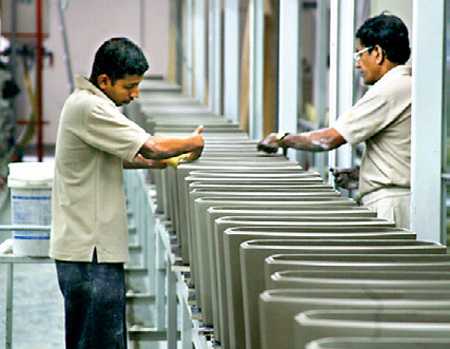Tuesday Feb 24, 2026
Tuesday Feb 24, 2026
Monday, 8 February 2021 00:00 - - {{hitsCtrl.values.hits}}

Officials of Sri Lanka Ceramics and Glass Council, and the Tiles and Sanitaryware Import Association, pose for a group picture following the amicable resolution
By Nisthar Cassim
 The manufacturers and importers of sanitaryware have, in a welcome sign of unity, reached a compromise to ensure free availability of their products in tandem with increased demand.
The manufacturers and importers of sanitaryware have, in a welcome sign of unity, reached a compromise to ensure free availability of their products in tandem with increased demand.
The two sides met on Friday to discuss a resolution to the issue relating to import duty and CESS applicable on imports, as well as the support to promote domestic manufacturing.
Following deliberations, both parties reached an amicable settlement which industry analysts described as “win-win” for all.
Importers have agreed for an increased Customs duty of 30% as against 15% at present. In terms of the CESS, a flat rate of Rs. 125 per kilo has been agreed. At present, certain sanitaryware products enjoy zero CESS and others are charged at 15% or Rs. 40 per kilo. The latter was viewed as promoting under invoicing in a bid to lower the figure.
As exclusively reported on Friday by the Daily FT, manufacturers had earlier said a revert to pre-2015 duty and CESS regime (25% duty or Rs. 75 per kg) was the best course to ensure both domestic production and imports can be in business.
Following the compromise, the Sri Lanka Ceramics and Glass Council, and the Tiles and Sanitaryware Import Association, jointly wrote to President Gotabaya Rajapaksa conveying the breakthrough.
They said the amicable resolution was in view of the President’s “Saubhagyaye Dekma,” which specifies that special attention be given to locally manufactured items and to increase local manufacturing capacity to satisfy the market demand. “We also have taken into account where there is a shortage of sanitaryware available to the public to allow the importers to meet this demand,” the joint letter to the President said.
Imports cater to 50% of the local demand.
The two Associations have requested the President take into account the agreement reached and to instruct officials to amend the present duty and CESS on imports and gazette accordingly.
The compromise also follows the Finance Ministry last Tuesday publishing a note indicating the relaxation of tile imports and the next day, the Controller General of Imports and Exports repealed to ensure support for local manufacturers is intact.
With the amicable resolution, restrictions are to be lifted paving the way free availability of sanitaryware products in the market.
“The duty and CESS structure prior to 2015 was very simple. It ensured both parties – manufacturers and importers – could do business. However, successive governments, influenced by vested interests, have blundered the structure, preventing equitable room for both sides to grow,” tile and bathware industry sources were quoted as saying by Daily FT in its Friday article.
A similar compromise and revision on duty and CESS structure for floor and wall tiles is expected to be reached by the industry as well.
The Yahapalana regime in 2015 revised the duty and CESS structure to favour imports, and local Industry warned that failure to revert to pre-2015 duty and CESS structure could see manufacturers resorting to imports.
Following President Gotabaya Rajapaksa and Prime Minister Mahinda Rajapaksa’s election promise of support to local manufacturers, five new companies have started producing bathware. The five new manufacturers are RSL Ceramics Ltd., OTTO Bathware, Ambilpitiya Ceramics, Hega Ceramics and Novel Ceramics. They join the local market leader Rocell Bathware. In the tile sector at present, there are only Lanka Tiles, Lanka Walltiles and Mack Tiles.
“New entrants in effect means fresh investments and more jobs. However, now there is uncertainty,” industry sources added.